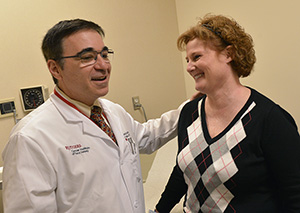May 1, 2015:
During National Melanoma/Skin Cancer Detection and Prevention Month, Big Ten Cancer Research Consortium member institutions are helping to raise awareness of skin cancers while advancing scientific knowledge through research that is making a difference in the lives of patients.
Carrie Best is one of those patients. Diagnosed with Merkel cell carcinoma, a rare cancer (only 2,000 cases were diagnosed in the U.S. in 2014), Best was determined to learn all she could about the disease and her options for treatment. She contacted physicians and researchers worldwide, and soon began treatment in Ohio. However, early in her treatment, Best learned that her cancer was not responding, and she was told her odds of recovery were less than one percent.
Not one to give up, Best made further calls that eventually led her to Howard L. Kaufman, MD, FACS, at the Rutgers Cancer Institute of New Jersey. Kaufman and his team had discovered that nearly 100 percent of Merkel cell carcinoma tumors overproduce a protein called programmed death-ligand 1 (PD-L1).
[Photo: Carrie Best meets with Rutgers CINJ associate director for clinical science/chief surgical officer Howard Kaufman, MD. Photo credit: Nick Romanenko/Rutgers University]
Kaufman is leading a clinical trial that is evaluating immunotherapy that targets PD-L1 in Merkel cell carcinoma. Best enrolled in this trial, and after just three treatments, her scans were clear — no visible sign of the tumors. Best is grateful for the drug that has turned her life around and for the kindness and care given by Kaufman and his team.
Read Carrie Best’s full, inspiring story here.
A Rolling Party to Benefit Skin Cancer Research
On June 27, an estimated 2,000 cyclists will participate in the Michigan State University College of Human Medicine Gran Fondo, a fun, non-competitive cycling event to benefit MSU skin cancer awareness, prevention, and research.
 The MSU Gran Fondo is a long-distance, mass participation event geared toward cyclists of all abilities, starting and ending in downtown Grand Rapids, Mich. Riders experience the scenic terrain of West Michigan and the Lake Michigan shore while on a rolling party to fight skin cancer.
The MSU Gran Fondo is a long-distance, mass participation event geared toward cyclists of all abilities, starting and ending in downtown Grand Rapids, Mich. Riders experience the scenic terrain of West Michigan and the Lake Michigan shore while on a rolling party to fight skin cancer.
Stops along the way are a foodie’s delight offering the area’s finest cuisine and the fresh taste of Michigan-sourced foods. The day culminates with the Finish Line Festival — an outdoor after party with craft brews, a grand feast, and live music.
[Photo: Cindy Partlo (left) rode in the 2014 Gran Fondo with her husband, Ron, Betty Kellenberger (middle), daughter Melissa Partlo (right). “Team Partlo” raised more than $1,500 for skin cancer research, in celebration of Cindy’s one-year recovery from skin cancer. Photo credit: Michigan State University College of Human Medicine]
Entering its third year, the Michigan State University College of Human Medicine Gran Fondo has quickly joined the ranks of top national rides. In January 2015, Gran Fondo Guide named it one of the “biggest and best” U.S. Gran Fondos. Already in its first two years, MSU’s “Big Ride” has raised nearly $300,000 for skin cancer awareness, prevention, and research.
For more information, visit msugranfondo.com.
Spotlight on Melanoma
In 2012, nearly 1 million people were estimated to be living with melanoma of the skin in the United States. The National Cancer Institute estimates there will be more than 73,000 new cases of melanoma in 2015. Melanoma is not as common as other skin cancers, but it is the most deadly; it is expected to claim the lives of nearly 10,000 people in the United States this year.
George Weiner, MD, director of Holden Comprehensive Cancer Center at the University of Iowa, says research had led to significant advances over the past several years in melanoma therapy, and that researchers at the University of Iowa are working to find even better ways to treat advanced melanoma. “This research extends from studies exploring the molecular causes of melanoma through development and testing of new targeted therapies and immunotherapies for patients with melanoma,” he said.
The University of Iowa Melanoma Multidisciplinary Oncology Group meets monthly to share and discuss melanoma-related projects that are being worked on at the University of Iowa. The group has provided funding to a number of researchers pursuing promising research, including:
- Robert Cornell, PhD: Transgenic delivery of a transcription factor that promotes melanocyte differentiation may suppress BRAF-driven melanoma
- Adam Dupuy, PhD: A forward genetic approach to identify mechanisms of melanoma metastasis
- Frederick Domann, PhD: CpG methylation of PHD3 is a novel biomarker for melanoma progression
- Michael Schultz, PhD: Peptide Receptor Targeted Image-guided Radionuclide Therapy for Metastatic Melanoma
- Anthony Snow, MD: BRAF and NRAS Mutations in Nodular and Superficial Spreading Melanoma
Big Ten CRC Clinical Trial Working Groups
At the heart of Big Ten CRC research development are clinical trial working groups (CTWGs), which consist of leading faculty researchers in their respective therapeutic areas. CTWGs meet regularly to provide input on new clinical trial concepts submitted by fellow CTWG members, and work closely with Big Ten CRC research development staff who shepherd concepts through the development process. The melanoma/cutaneous oncology CTWG currently includes more than two dozen investigators, representing ten institutions.
This story was adapted from content provided by Big Ten Cancer Research Consortium member institutions.
About the Big Ten Cancer Research Consortium: The Big Ten Cancer Research Consortium creates a unique team-research culture to drive science rapidly from ideas to treatment-changing paradigms. Within this innovative environment, today’s research leaders collaborate with and mentor the research leaders of tomorrow with the unified goal of improving the lives of all patients with cancer.
About the Big Ten Conference: The Big Ten Conference is an association of world-class universities whose member institutions share a common mission of research, graduate, professional and undergraduate teaching and public service. Founded in 1896, the Big Ten has sustained a comprehensive set of shared practices and policies that enforce the priority of academics in the lives of students competing in intercollegiate athletics and emphasize the values of integrity, fairness and competitiveness. The broad-based programs of the 14 Big Ten institutions will provide over $200 million in direct financial support to almost 9,500 students for more than 11,000 participation opportunities on 350 teams in 42 different sports. The Big Ten sponsors 28 official conference sports, 14 for men and 14 for women, including the addition of men’s ice hockey and men’s and women’s lacrosse since 2013. For more information, visit www.bigten.org.















Subscribe to the Big Ten CRC Newsletter X
X Facebook
Facebook YouTube
YouTube